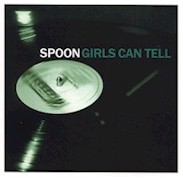|

Spoon
the rapture of britt daniel
by tim mcmahan
|
|
|
April 19
Spoon, The Good Life,
The Oranges
Sokol Underground
13th and Martha
9 p.m.
Lazy-i: April 17, 2001
|
"I have a pet peeve when something's
being said too often about the band," said Spoon lead vocalist Britt
Daniel. "Right now, it's 'Spoon, the band that got fucked by
Elektra.' That may be so, but our new record is really good. I'd rather
talk about the music and what the lyrics mean than about the music
business."
Unfortunately, Daniel and his band are as responsible for the unwanted
attention as the press. After all, it was Spoon who recorded "The
Agony of Laffitte" b/w "Laffitte Don't Fail Me Now," a
two-song "concept single" released on Omaha's Saddle Creek
Records. The mini epic took on the band's former record label, Elektra,
its A&R guy, Ron Laffitte, and collaterally, Elektra chairman Sylvia
Rhone. Among the lyrics: "It's like I knew two of you, man/The one
before and after we shook hands," the chorus "You're no
better than Sylvia." and "Now all I want to know/Are you
ever honest with anyone?"
The bitter lament was released in 1999. Since then, Spoon has recovered
from unceremoniously being dropped by Elektra only months after their
major label debut, A Series of Sneaks, was released.
It's ancient history, really. A new day has dawned for the Austin,
Texas, trio that is rising triumphantly from the ashes with their
impressive debut on Merge, Girls Can Tell, that SPIN called
"pure rock wizardry -- as sinister as it is sweet." The tour
that brings them to Omaha's Sokol Underground April 19 features indie rock
legends Guided By Voices on most of the dates (Omaha, mysteriously, was
not one of them). But despite their newfound glory, that bitter little CD
single lives on, if only in the minds of eager music journalists looking
for an angle to hang their stories on. |
|
|
Daniel acknowledged the situation via
phone from his Austin home just a couple days before leaving on this tour.
"The record and music industry need to be exposed when they're
unjust. In that sense, I don't mind talking about it," Daniel said
about all the attention over the Elektra split. "That said, I think
there are more things to talk about than the gloomy state of the music
industry."
Spoon forged its reputation in the '90s as an indie-rock, post-punk
band cast in the same mold as The Pixies. These days, however, their sound
doesn't bear even the slightest resemblance to those pre-grunge lords of
alternative distortion. In fact, on their new CD, Spoon comes off more
like a straight-ahead rock band than anything in the cloistered indie
music camp, and Daniel couldn't be happier.
"I never was a big fan of indie rock as a genre," he said.
"When it came time to record this album, we wanted it to have a '60s
flair, to have soul. Compared to Series of Sneaks, I think the
songs are more traditional in structure and content, sort of like the
Everly Brothers."
The Everly Brothers? I wouldn't go that far. But from the opening
track, with its relaxed, chiming keyboards, cool spy guitar and spare kick
drum, the focus is solidly on melody and Daniel's distinctively yearning,
emotive voice. The arrangements are simple to the point of being stripped
down. And throughout the entire CD, it's impossible to deny the obvious
influences, including on the Beatle-esque "Lines in the Suit;"
the early Cure-ish "Take a Walk," the Zeppelin-lite "Fitted
Shirt" and the E. Costello stab "Take the Fifth." Daniel
flinched when the vocals on "Anything You Want" were compared to
classic Thin Lizzy. "That's not the first time I've heard that
comparison," he said, grudgingly.
Call it pop rock for lack of a better term. The music on Girls Can
Tell is undeniably sleek, catchy and hip, the perfect soundtrack for a
yuppie summer vacation.
"The kind of records I go to time and time again -- the classics
-- are the ones you want to sing along to, that through-and-through have
solid songs," Daniel said, "like Revolver, where every
single song is a solid song. There are some aspects of the record that are
innovative, but we're not reinventing the wheel, we just wanted to make a
solid album." |

|
"I
never was a big fan of indie rock as a genre. When it came time to
record this album, we wanted it to have a '60s flair, to have soul." |
|
|
|

|
"By and large, it's a crap shoot --
especially right now -- to try and sign your life away." |
|
|
Listed in the CD's liner notes, among the
industry names, friends and fellow artists, Spoon "sincerely
thanks" Omaha, Nebraska. Daniel explained that when the band was
touring its first album back in '96, the crowds were sparse and life on
the road had become a drag.
"We played Omaha not expecting much after having played Fargo the
night before," he said. "To our surprise, all these people
showed up. We sang karaoke somewhere downtown and went to a house party
after that. We had a great time, and back then that was a rarity."
The band also forged friendships with a number of musicians who play in
Saddle Creek Records' stable of bands, including Stephen Pedersen, who at
the time was in Cursive and is now in the Chapel Hill band The White
Octave. "Omaha is just a great place," Daniel said. "I
don't know if people who live there think that, but we always have a good
time when we visit. It doesn't have any sort of built-in network of places
that makes it a fun city. It's just the kids being original and
creative."
When Spoon were looking for someone to release the "Laffitte"
single, Saddle Creek Records was an obvious choice. "Robb Nansel and
Stephen (Pedersen) told us that we were welcome to put out a record on
their label," Daniel said. "We had just come up with the idea
for the concept single. At first Robb wanted more songs on it, and that
would have made it economically better for the label. But we didn't want
to dilute the message, and to his and the people who run the label's
credit, they were cool doing just two songs."
The Laffitte single garnered its share of national press, including a
sizeable feature in The Village Voice that recapped the band's
label debacle and lauded their artistic response, calling it "a
balance of compassion and blame and fury and guilt and impatience."
If there's a lesson from the band's experience with Elektra (other than
to trust no one), it's that major labels don't guarantee success. Is
smaller really better? Since its release earlier this year on the
relatively small label Merge -- which was founded by Superchunk's Laura
Balance and Mac McCaughan -- Girls Can Tell has easily outsold
Spoon's Elektra release.
"Merge has an office of maybe four or five people," Daniel
said. "So far we've already sold four times as many copies of Girls
Can Tell in six weeks than A Series of Sneaks sold in a
year."
After everything Spoon's been through -- their early success on indie
label Matador Records, their move to a major, their subsequent fall and
their current rebirth, Daniel is hesitant to pass on any advice to the
next band that makes its way though the music industry meat grinder.
"Anyone taking advice from me is probably…" he says,
trailing off before finishing the sentence. "Look at the bands you
admire and look at how they would do things. Look at the bands who's level
of success you'd hope to achieve. By and large, it's a crap shoot --
especially right now -- to try and sign your life away."
Back to 
Published in The Omaha Weekly April 18, 2001. Copyright ©
2001 Tim
McMahan. All rights reserved. |
|
|

![]() webboard
interviews
webboard
interviews